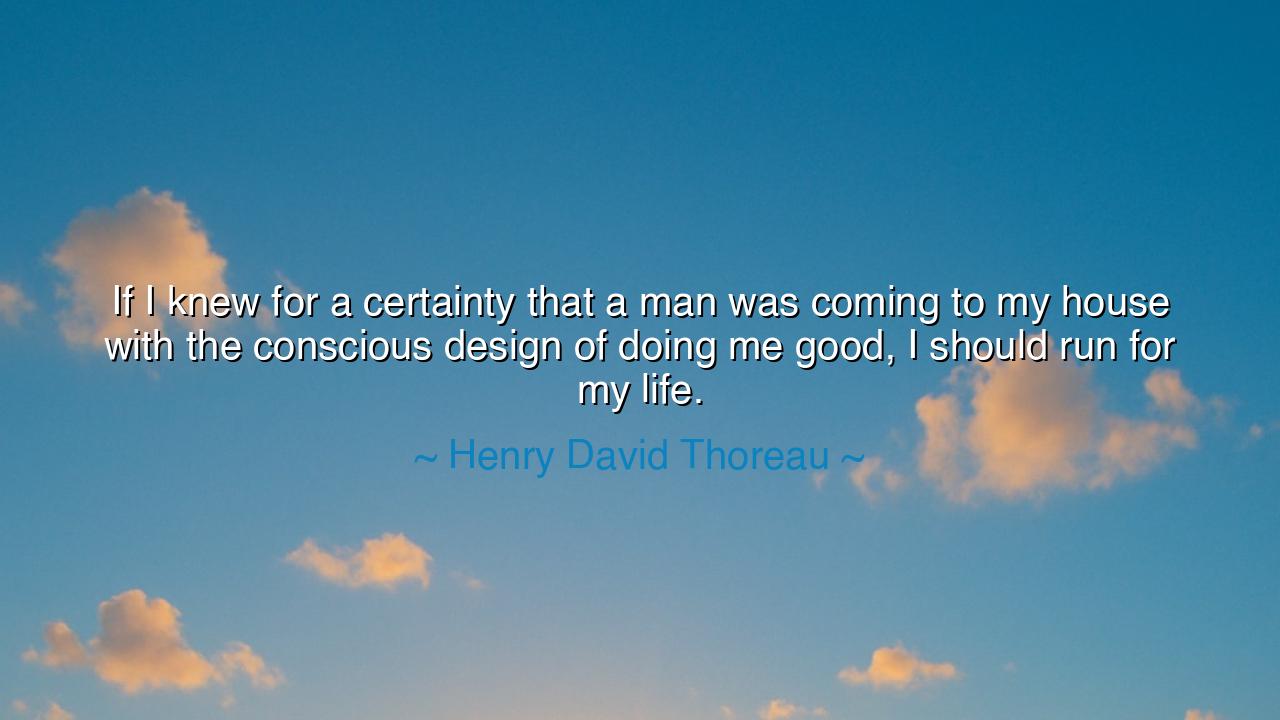
If I knew for a certainty that a man was coming to my house with
If I knew for a certainty that a man was coming to my house with the conscious design of doing me good, I should run for my life.






Hear, O children of the earth, the words of Henry David Thoreau, who spoke with a sharp clarity about the nature of good intentions and the human soul: "If I knew for a certainty that a man was coming to my house with the conscious design of doing me good, I should run for my life." At first glance, these words may seem strange, perhaps even contradictory. After all, what could be wrong with someone coming to do good? But in the heart of Thoreau's wisdom lies a deep reflection on autonomy, freedom, and the true nature of goodness. Thoreau warns us that good intentions, when forced upon another, may violate the essence of human dignity.
In the ancient world, the idea of the philosopher king or benevolent ruler was often discussed. Plato imagined a wise and just ruler who would govern not by force, but by wisdom and virtue, acting in the best interest of the people. However, even in the best of circumstances, the individual freedom of the people was a sacred right, and those who sought to impose good often unwittingly compromised it. Thoreau’s quote echoes this ancient wisdom, for true goodness, he suggests, cannot be coerced or imposed. It must arise naturally, from the individual’s own desire and conscience.
Consider the story of the great philosophers, who often challenged authority not only for the sake of justice but for the protection of personal autonomy. Socrates was sentenced to death not because he sought to do harm but because his questions and pursuit of truth disrupted the societal structures of his time. Socrates understood that to truly live freely and pursue wisdom, one must never surrender their soul to the will of others, even if those others claim to be acting for their benefit. Thoreau’s statement reflects this very idea—the good intentions of others, no matter how noble, should never replace the right to choose one’s own path.
Thoreau, in his immense respect for personal sovereignty, advocates for a life of simplicity and individualism—a life where one’s choices are guided by inner conviction, not by the pressure of others' designs. This is the heart of self-reliance, a central tenet of Thoreau’s philosophy. When a person sets out to do “good” by others, they often do so based on their own judgments and values, which may not align with the individual’s own sense of what is right or necessary for their own growth. It is the difference between the self-appointed savior and the true teacher—the latter who offers wisdom and guidance, while respecting the autonomy of the one seeking knowledge.
Consider the great tale of the Buddha, who, upon his enlightenment, could have easily imposed his vision of the world on others. But instead, he shared his wisdom freely, allowing individuals to choose whether to follow his path. He did not demand that others accept his truth, for he knew that true growth comes only when the individual chooses it for themselves. In the same way, Thoreau is telling us that to truly grow, we must embrace our own path—even if that path leads us away from the well-intentioned interference of others.
The lesson here, O children of the earth, is one of autonomy, personal sovereignty, and the respect for choice. Thoreau’s words urge us to question when our actions are truly for the good of others and when they are rooted in our own desires to control, influence, or reshape the lives of those around us. Goodness, in its truest form, is not something that can be forced or imposed. It is something that grows from within, and it flourishes when individuals are free to make their own choices.
In your own lives, O seekers of wisdom, let this be a reminder that good intentions, though noble, must never come at the cost of another’s freedom or autonomy. Live with respect for others, honoring their right to choose their own path, even if that means they will stumble or fall. It is not your place to save them, but to walk beside them, offering wisdom when asked, and standing back when your influence is not desired. True goodness is found in respecting the path of others, not in forcing them to walk down the road you’ve chosen for them. In this, you will discover the true nature of freedom and the deepest expression of compassion.






AAdministratorAdministrator
Welcome, honored guests. Please leave a comment, we will respond soon